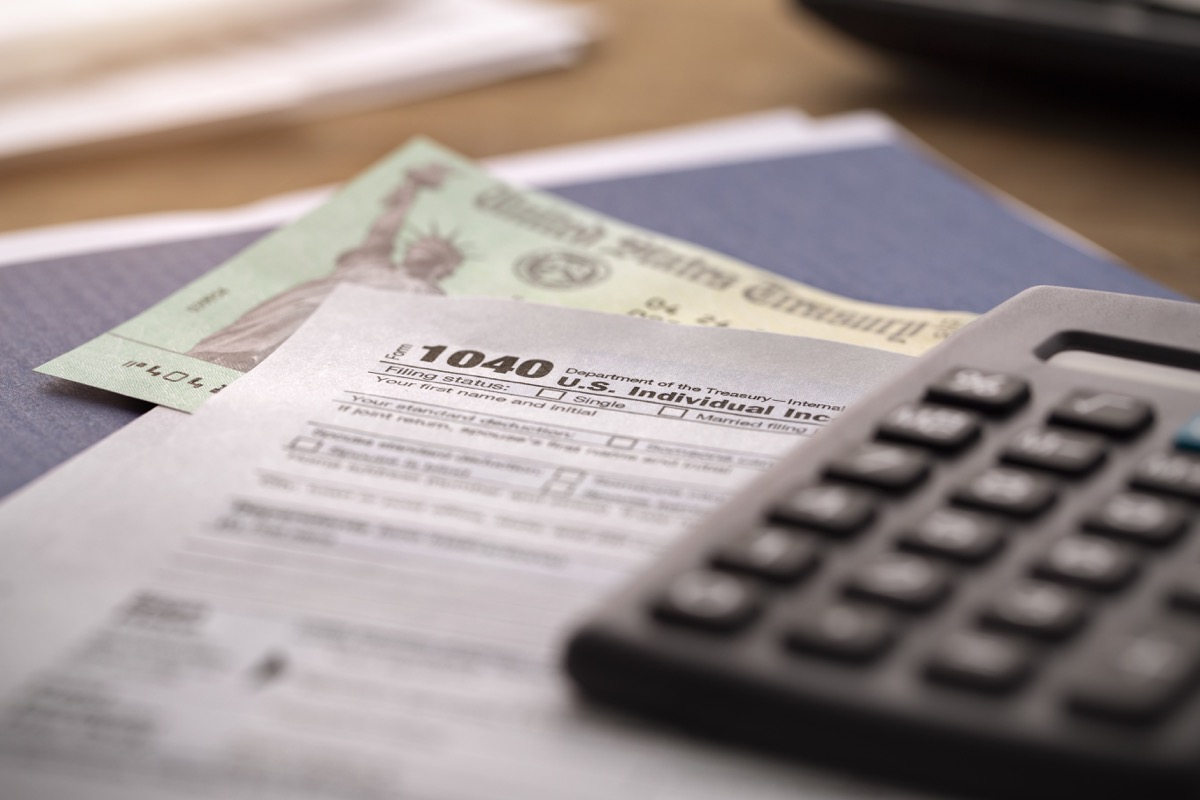This Common Mistake Could Delay Your Tax Refund This Year, IRS Says

As we all learned this past year, very few things in life are a given—but one of them, as it’s often said, is taxes. Yes, tax season is here, even though the IRS pushed back the filing and payment deadline to May 17. And, as if filing taxes wasn’t already confusing enough, the addition of stimulus checks sent to many Americans throughout 2020 is adding some extra bumps in the road in the process. In fact, the Internal Revenue Service (IRS) is already warning about a common mistake that could delay your tax refund this year. Read on to find out what error you need to avoid and for more on future boosts to your bank account, check out This Is How Your Fourth Stimulus Check Would Be Different From the Others.
Your tax refund could be delayed if your Recovery Rebate Credit is incorrect.

There’s a new section on this year’s tax return: the Recovery Rebate Credit. As Kari Brummond, a tax preparer and accounting writer for TaxDebtHelp, previously explained to Best Life, people can apply for this credit if they did not receive all the stimulus payments in 2020 that they qualified for based on their 2020 income because the IRS was looking at 2018 and 2019 tax returns at the time. Tax Adviser says common reasons why taxpayers may claim this credit include “reduced income in 2020, a change in marital filing status, or a change in the number of dependents.”
But the IRS says many taxpayers are making an error with the Recovery Rebate Credit on their tax returns that may result in their tax refund being delayed. “Anytime there is something new on the tax return, it usually has an elevated error rate,” Mark Luscombe, a principal analyst for Wolters Kluwer Tax & Accounting, told USA Today. “So the IRS may have a greater volume of erroneous tax returns than normal, and refunds are generally slowed when the IRS detects such errors.”
And if you’re still missing a check, check out If You’re Missing Money From Your Stimulus Payment, Check This Now.
The IRS will send you a letter if your tax return needs to be corrected.

According to a statement from the IRS on April 5, the agency has started mailing letters to some taxpayers who claimed the 2020 Recovery Rebate Credit and are getting a different amount than they expected or filed for. “If a correction is needed, there may be a slight delay in processing the return, and the IRS will send the taxpayer a letter or notice explaining any change,” the agency explained.
However, the IRS will automatically calculate the correct amount, make the correction, and continue processing your return. If you “disagree with the IRS’ calculation,” they ask that you review the letter they send and their Frequently Asked Questions page before contacting them.
And for more warnings from the agency, If You Get an Email From the IRS With These 3 Words, Don’t Click on It.
There are several reasons the IRS may have corrected your tax return.

The IRS will determine your eligibility for the Recovery Rebate Credit and the amount of credit due based on your 2020 tax return information and the amount of any stimulus payments already issued to you, which will be subtracted from what they give you. If they calculate a different amount than you did when applying for the credit, it could be for a number of reasons.
For example, the IRS says they have already corrected taxpayers’ credits because an individual is already being claimed as a dependent on another person’s 2020 tax return, the individual did not provide a Social Security number valid for employment, a qualifying child is 17 or older as of Jan. 1, 2020, or math errors related to your own calculations for your adjusted gross income and any stimulus payments already received.
And for more up-to-date money matters you need to know about, sign up for our daily newsletter.
Most people don’t actually need to apply for this credit.

The Recovery Rebate Credit is only for people who did not receive the first or second stimulus check but were eligible or did not receive the full amount they are eligible for. The first and second stimulus payments “were advanced payments of the 2020 credit,” the IRS explained in their statement. “Most eligible already received the first and second payments and shouldn’t or don’t need to include this information on their 2020 tax return.” And for more on future stimulus payments, This Is How You Could Receive More Stimulus Money Right Now.